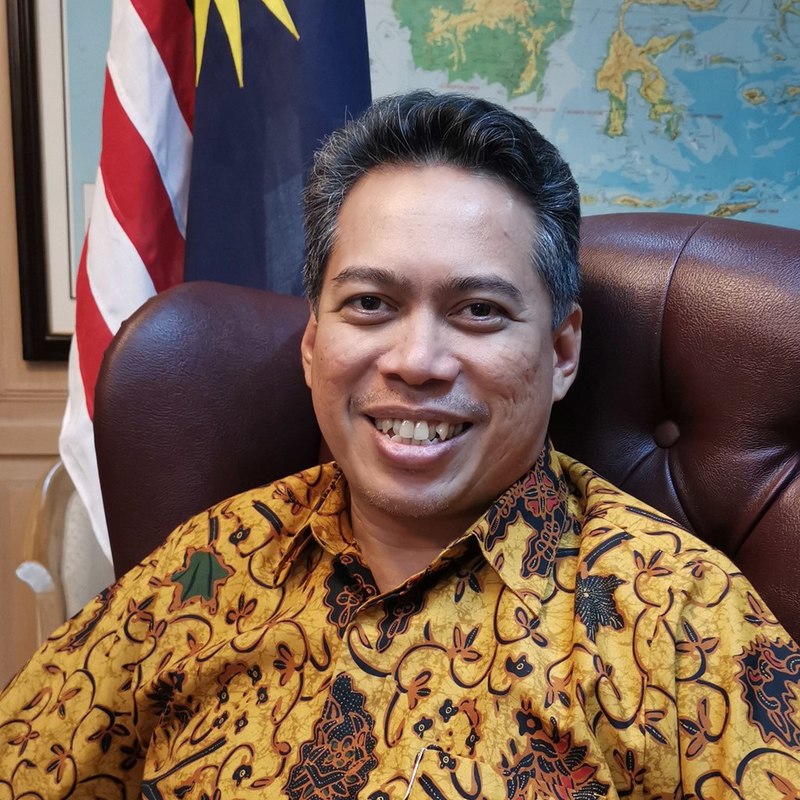Malaysia and Indonesia have shared a connection for years. NOW! Jakarta spoke to the Chargé d’Affaires about this special relationship and the bilateral connections forged over the years.

How are relations between Malaysia and Indonesia today?
Malaysia and Indonesia share strong historical ties. Before the existence of our boundaries, our people freely moved from one place to another in this Malay Archipelago we dearly call Nusantara. The various ethnicities that exist in Indonesia, also exist in Malaysia, albeit smaller in number. We have Melayu, Jawa, Bugis, Batak, Minang, Iban, Dayak and many more. The same goes for Indonesia.
Therefore, we will always adhere ourselves to the popular term “serumpun”. Serumpun gives a sense of family and togetherness. We share the same roots but we grew and bloomed different branches. But the roots that we share give life and strength to what we have turned out to be today.
When Malaysia achieved its independence in 1957, Indonesia was among the first countries that we established diplomatic relations with. Today, 61 years have passed, despite the ups and downs in our relations, the ties remain stronger than ever.
We are able to resolve many neighbourly issues through this special relationship that we have. This encompasses all aspects, including leader-to-leader, government-to-government, military-to-military, business-to-business and people-to-people. From the point of view of the government, we are able to solve complex issues together through sincere and honest discussion. This is particularly important to be preserved between us as there are too many distrust in the current state of the global affairs.
It is my fervent hope that this special connection will continue to be stronger in many generations to come. This is vital, not just bilaterally, but most importantly for ASEAN.
Defence ties between the two countries are a particular point of focus. Can you tell us more about this in light of the recent visit by a Malaysian Defense delegation?
Malaysia and Indonesia enjoy warm and strong relations in the security and defence sector. We have various mechanisms and platforms under the bilateral framework for us to ensure that such cooperation remains solid. The armies, navies and air forces hold engagements at all levels through joint operations and trainings. Together we seek to address our common interest, primarily to fight current cross border crime, including terrorism, piracy, drugs and human trafficking. The key to the success of defense cooperation lies in the relations between the personnel.
Both countries have a lot of interest in ensuring that militaries of both sides understand each other better. Besides the engagements through official platforms, we encourage visits from Malaysian Armed Forces Staff College and Malaysian Armed Forces Defence College to Indonesia. The idea is for the participants to learn more about Indonesia and explore future potential collaborations in their respective fields. It is also a good opportunity for them to network with their counterparts. We have had success stories when military leaders began their friendships through such military courses. Therefore, we intend to make these visits an annual affair.
We believe that, for us to face modern day challenges and threats, we have to forge close military and security ties between countries, more so with our closest neighbour. I am proud to say that our defense relations continue to be the hallmark of our bilateral ties.
Earlier this year there were plans for opening branches of Malaysian universities in Indonesia. How are those plans going? What are some of the advantages you see for Indonesian students in this regard?
The first incoming visit in 2019 from Malaysia was the working visit by His Excellency Dr. Maszlee Malik, Minister of Education of Malaysia. The visit in January was his maiden visit to Indonesia as a minister and I can say that the visit has opened up many possibilities of new cooperation between Malaysia and Indonesia. We have looked into the cooperation in language, book industry and most importantly, in higher education.
Malaysia hosts thousands of Indonesian students in our universities and vice versa. We intend to work on increasing those numbers. As much as this would create a learned generation, this is also important in bringing the peoples of Malaysia and Indonesia closer together, through education.
Several top Malaysian universities have expressed their intentions to open their satellite campuses in Indonesia, to be based in the existing partner universities in Indonesia. Since it requires local partner universities, more time is needed to find a perfect match before matters could proceed further. Several Malaysian universities have begun engaging with Indonesian partners and we hope to see positive development soon.
Based on a win-win strategy, we hope to drive down the tuition cost for Indonesians but for a world-class education quality. Targeting professional adults, the arrangement would be suitable for those who would like to pursue postgraduate studies (S2 and S3) on part time basis. Why would you travel all the way to other countries to study when you can do it here in Indonesia? Five Malaysian universities are now ranked in the top 300 universities in the world and we continue to climb up the ladder. We hope to bring those universities here.
The Education Malaysia at the Embassy is directly involved in this matter. We call on the readers to engage with them should they are interested to study in Malaysia or forge any cooperation between the universities.
The two countries have vowed to challenge the EU directive on non-renewable energy. Please tell us more about this and where the countries stand at the moment.
Between Malaysia and Indonesia, the economic cooperation is so intertwined that we share many mutual interests together. One of them is palm oil. Both countries have been working extremely hard to ensure that this commodity remains sustainable, economically, socially and environmentally. I am proud to say that palm oil is a significant contributor to the economic and social development of both Malaysia and Indonesia. It has created millions of job opportunities and pulled millions more out of poverty. Malaysia and Indonesia have been working together in all palm oil related issues since the establishment of the Council of Palm Oil Producing Countries (CPOPC).
Palm oil is the most versatile vegetable oil. It can be found in almost 50 percent of the packaged products at the supermarkets. It is also an efficient crop, yielding approximately 3.3 tons per hectare. Substituting it to other vegetable oils in the market would require between three to 10 times more lands.
The Renewable Energy Directive (RED) II Delegated Act as adopted by the European Commission is regarded as discriminatory towards palm oil as it singled out and classified palm oil biofuel as unsustainable. The same was not said against soybean oil despite research done by an in-house EU research body stated that soybean oil is responsible for far more ‘imported deforestation’ compared to palm oil.
Both Malaysia and Indonesia are committed to fighting against the discrimination through all possible means. Recently, both countries undertook a Joint Mission and presented a joint letter signed by both Prime Minister Tun Mahathir Mohamad and President Joko Widodo to Her Excellency Heidi Hautala, Vice President of the European Parliament in Brussels, to express our views.
Given some of the similarities between the two countries, what can be done in terms of fostering a strong cultural exchange?
Culture defines us. It is the trait that makes us uniquely human. Indonesia is a land of vast cultures, so as Malaysia. As people moved freely in the olden days, they brought along with them their culture, food, religion, beliefs and many other aspects. As much as we focus on the commercialization of culture under the tourism industry, we must not lose sight of its huge potential as the binding element that could bring our two nations closer.
There are many similarities in our culture, which reflects the connections that we share through the complexities of our social fabrics. But if one were to look deeper, there are points of divergence as a result of cultural evolution. This is where I see the opportunity for Malaysia and Indonesia to increase engagement and of course through people-to-people exchanges we can understand each other better.
Malaysia continues to support, synergise and endorse programmes and collaborations with Indonesia, for future regional programmes and activities. For example, we are currently looking into bilateral cooperation on wood carving industry. We also frequently encourage Malaysians to study arts in Indonesia and vice versa. Internationally, both countries is working together to register pantun in the UNESCO Intangible Heritage List. The list goes on and on.
Recently, we have launched an Instagram account @IgersAsian that unites famous Malaysian and Indonesian Instagrammers through their love of photography and arts. We decided to start this movement in Jakarta and hope to spread it to other Asian countries. It is a truly unique initiative that now we can see the world through their lens, and most importantly, we can see the beauty in each other.
This article is originally from paper. Read NOW!Jakarta Magazine May 2019 issue “Kids, Family, and Education”. Available at selected bookstore or SUBSCRIBE here.






